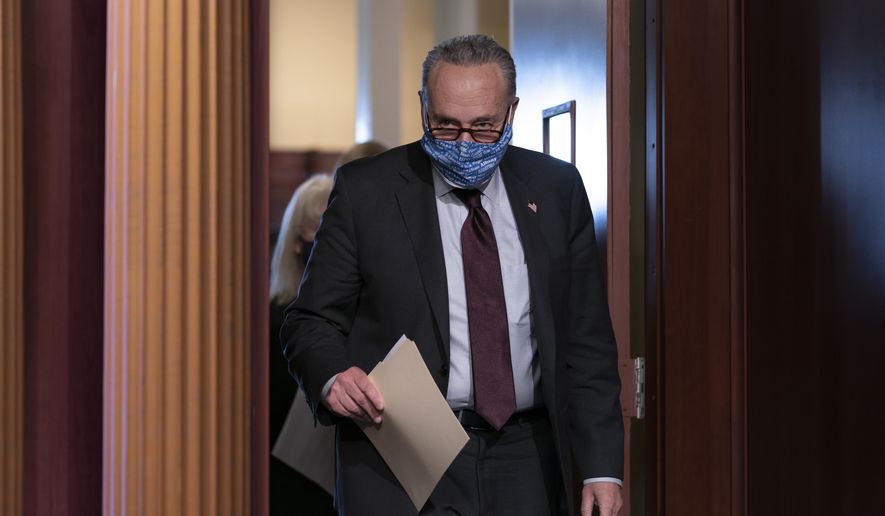Both the House and Senate kicked off their debates over a new budget resolution Tuesday, blazing a path that could lead to them trying to push through a COVID-19 relief package without earning any Republican support.
Senators voted along party lines, 50-49, to take up the budget, which will dominate the chamber the rest of this week. The House voted 216-210 to set rules for their own debate, which will happen Wednesday.
Senate Majority Leader Charles E. Schumer said Democrats will not “dilute” or “delay” a rescue bill over GOP objections, pointing to shuttered schools and continued high unemployment claims as evidence of an immediate need.
“Time is a luxury our country does not have,” the New York Democrat said.
He also brushed aside the offer a group of Republicans delivered to President Biden this week for a $600 billion package, saying it falls far short of the $1.9 trillion plan the president proposed.
“If we did a package that small we would be mired in the COVID crisis for years and we are not, we are not going to make the mistake of 2009 and have too small of a package and took too long, took four or five years for the economy to recover,” Mr. Schumer said.
Mr. Schumer and House Speaker Nancy Pelosi revealed their 2021 budget plan on Monday. It is the first step in a process that could allow them to pass Mr. Biden’s $1.9 trillion plan without a single GOP supporter.
The two leaders want to have a final vote on the budget by the end of the week, before the Senate gets bogged down in the impeachment trial of former President Donald Trump.
The Democrats’ proposal calls for another round of stimulus checks, another round of unemployment benefits, and $350 billion in bailout money for state and local governments that say they face their own budget squeeze.
Mr. Biden also has proposed raising the federal minimum wage to $15 as part of the bill. That’s a non-starter for Republicans and even for some centrist Democrats such as Sen. Joe Manchin of West Virginia.
“I personally support an increase in the minimum wage, not to $15, but I think we need one. But it doesn’t belong in the COVID,” said Sen. Susan Collins of Maine, a key GOP negotiator.
Cracks are already beginning to show in Democrats’ plans, though.
In the House, three Democrats joined Republicans in voting against the rules for debate Tuesday.
And while Mr. Manchin voted Tuesday to take up the budget, he wants to make sure Republicans have a voice as legislation gets written.
That could challenge Democratic leaders, who turned to the budget process precisely because it allows them to circumvent a GOP filibuster in the Senate and pass legislation on the strength of their 50-seat caucus and Vice President Kamala Harris’s tie-breaking vote.
Tuesday’s moves are just the beginning. If the budget passes both chambers of Congress, committees then must write bills to carry out the plan. Those committee bills are then stitched together in what’s known as a reconciliation package, which must then pass Congress and be signed by the president.
Mr. Schumer insisted there’s still a window for Republicans to cooperate, but GOP lawmakers this week said using the budget process would send the wrong signal.
Sen. Rick Scott, Florida Republican, said the move does not show the “unity” that Mr. Biden has touted.
Republicans object to adding funds into the budget to bail out “blue states” such as New York and Illinois.
“They have chosen a totally partisan path,” said Senate Minority Leader Mitch McConnell, Kentucky Republican, adding there likely will be multiple amendments to the proposal later this week.
• Stephen Dinan can be reached at sdinan@washingtontimes.com.
• Alex Swoyer can be reached at aswoyer@washingtontimes.com.




Please read our comment policy before commenting.